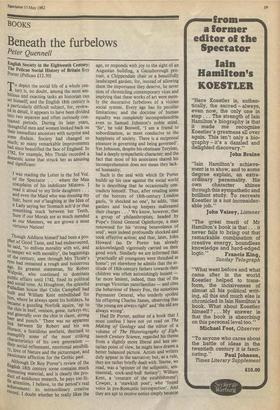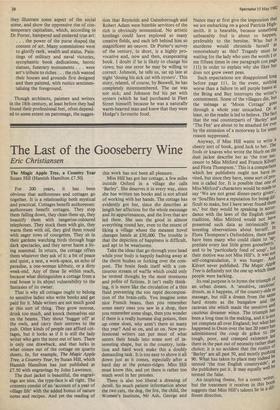BOOKS
Beneath the furbelows
Peter Quennell
English Society in the Eighteenth Century: The Pelican Social History of Britain Roy Porter (Pelican £12.50)
To depict the social life of a whole cen- tury is, no doubt, among the most am- bitious and exacting tasks an historian can set himself; and the English 18th century is a particularly difficult subject, for, review- ed in detail, it appears to have been divided Into two separate and often curiously con- trasted periods. During its later years, thoughtful men and women looked back on their immediate ancestors with surprise and some disdain. Society had changed so much; so many remarkable improvements had since beautified the face of England. In 1782, for example, Mrs Thrale recorded a domestic scene that struck her as amusing and significant;
I was reading the Letter in the 3rd Vol. of the Spectator . . . where the Man complains of his indelicate Mistress. I read it aloud to my little daughters . . . and even the Maid who was dressing my hair, burst out o'laughing at the Idea of a Lady saying her Stomach ach'd or that something stuck between her Teeth. Sure if our Morals are as much mended as our Manners, we are grown a most virtuous Nation!
Though Addison himself had been a pro- phet of Good Taste, and had endeavoured, he said, 'to enliven morality with wit, and to temper wit with morality', the beginnings of the century, seen through Mrs Thrale's eyes had remained a rough and boisterous Walpole Its greatest statesmanti , Sir Robert , who cont to dominate Public affairs until 1742, fixed its political and social tone. At Houghton, the splendid Palladian house that Colin Campbell had built and William Kent embellished for became where he always spent his holidays, he oecame a guzzling Norfolk squire, `up to the chin in beef, venison, geese, turkeys etc; ,and generally over the chin in claret, strong bee and punch.' There was no apparent Inlk between Sir Robert and his son Horace, a fastidious aesthete, destined to exemplify some of the most striking characteristics of his own generation — their social refinement, emotional sensibili- ty, love of Nature and the picturesque, and Passionate affection for the Gothic past. Although Dr Roy Porter's review of the English 18th century scene contains much Interesting material, and is clearly the pro- duct of assiduous research, he pays too lit- tie attention, I believe, to the period's real achievement: its extraordinary creative record. I doubt whether he really likes the
age, or responds with joy to the sight of an Augustan building, a Gainsborough pro- trait, a Chippendale chair or a beautifully landscaped garden; for, instead of allowing them the importance they deserve, he never tires of chronicling contemporary vices and implying that these works of art were mere- ly the decorative furbelows of a vicious social system. Every age has its peculiar limitations; and the doctrine of human equality was completely incomprehensible even to Samuel Johnson's noble mind. 'Sir', he told Boswell, 'I am a friend to subordination, as most conducive to the happiness of society. There is a reciprocal pleasure in governing and being governed'. Yet Johnson, despite his obstinate Toryism, had a deeply sympathetic character; and the fact that most of his associates shared his incomprehension does not mean they lack- ed humanity.
Such is the zeal with which Dr Porter builds up his case against the social world he is describing that he occasionally con- tradicts himself. Thus, after retailing some of the horrors of 18th-century London gaols, 'it shocked no one', he adds, 'that gaolers and lock-up keepers maltreated their charges . . .' We know, however, that a group of philanthropists, headed by Pope's friend General Oglethorpe, a man renowned for his 'strong benevolence of soul', were indeed profoundly shocked and took effective action; and that, later, John Howard (as Dr Porter has already acknowledged) vigorously carried on their good work. Similarly we are informed that `practically all youngsters were thrashed at home'; yet elsewhere he admits that the at- titude of 18th-century fathers towards their children was often astonishingly lenient far more lenient, indeed, than that of the average Victorian paterfamilias — and cites the behaviour of Henry Fox, the notorious Paymaster General, who tenderly spoiled his offspring Charles James, observing that 'the young are always right' and 'the old are always wrong'.
Had Dr Porter, author of a book that I must confess I have not yet read on The Making of Geology and the editor of a volume of The Historiography of Eigh- teenth Century Science, regarded his theme from a slightly more liberal and less sec- tarian point of view, he might have drawn a better balanced picture. Artists and writers duly appear in the narrative; but, as a rule, they are rather briefly dealt with. Sterne, we read, was a 'spinner of the solipsistic, sen- timental, cock-and-bull fantasy'; William Kent, a 'creature of the establishment% Cowper, a 'mawkish poet', who 'found voice in pre-Romantic introspection'. And they are apt to receive notice simply because
they illustrate some aspect of the social scene, and show the oppressive rise of con- temporary capitalism, which, according to Dr Porter, hampered and enslaved true art: . . . the power of the purse shaped the content of art. Many commissions were to glorify rank, wealth and status. Pain- tings of military and naval victories, sycophantic book dedications, heroic statues, funerary monuments . . . were art's tribute to riches . . . the rich wanted their houses and grounds first designed and then painted, with rustics sentimen- talising the foreground.
Though architects, painters and writers in the 18th century, at least before they had found their professional feet, often depend- ed to some extent on patronage, the sugges- tion that Reynolds and Gainsborough and Robert Adam were humble servitors of the rich is obviously nonsensical. No artistic hirelings could have explored so many creative fields, and each left behind him so magnificent an oeuvre. Dr Porter's survey of the century, in short, is a highly pro- vocative and, now and then, exasperating book. I doubt if he is likely to change his views; but one error he may be willing to correct. Johnson, he tells us, sat up late at night 'dosing his sick cat with oysters'. This story, related, of course, by Boswell, he has completely misremembered. The cat was not sick; and Johnson fed his pet with oysters (which he had purchased in Fleet Street himself) because he was a naturally warm-hearted man and knew that they were Hodge's favourite food.







































 Previous page
Previous page